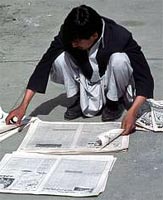Training and professionalisation of rural media in Pakistan
06-02-2006 (New Delhi)

In the end of 2005, 10 workshops for district correspondents from the North West Frontier Province (NWFP) of Pakistan were organized by UNESCO, in the framework of its programme on promoting freedom of expression and human resource development in the media field.
Training media professionals in a peripheral region like NWFP of Pakistan has remained a dire necessity for more than a decade. During the last two decades this region has become a very important center of information because of the Afghan war. Therefore, journalism has become an alluring profession and many have joined scores of local, national and international media outlets, print and electronic.
The department of Journalism and Mass Communication at the University of Peshawar remained active in organizing on-the-job training programmes for the less educated, underpaid, part-time reporters who are commonly known as District Correspondents (DCs). More than 700 professionals are scattered across 24 districts and 7 tribal areas of the province. However, during these years the lack of proper resources has hindered the implementation of a proper training scheme both in terms of costs of participation and inclusion of the topics necessary to deal with the professional crisis occasioned by these accidental entrants into the field.
The main idea behind the UNESCO training program was to develop the human resource potential in media, through training district correspondents in NWFP. The logic of investing into this human group in the province was that the journalists were important agents of social change in this society. Their accidental entry into the profession was a handicap that made them susceptible to corruption and non-professional practices, including weak reporting skills. Another main weakness was their inability to understand the New Journalism, namely, reporting under tension and conflict reporting.
The developmental responsibilities of journalist professionals were never thought about within this group. Thus, the training program revolved around three main areas, namely, elementary reporting and editing skills, ethical ideals and problems and the New Journalism. This was a great success bearing in mind level of education and professional competence of the group. For most, journalism was not their full time profession (mostly vendors and small business holders), without a regular salary. The discussion on ethical ideals and problems led to the understanding of the importance of social responsibility and the dilemma in fulfilling these responsibilities due to scores of reasons, ranging from personal inability to break the taboos to socio-political pressures, daily survival and non-cooperation of the owners of the media organizations.
Developmental reporting and understanding social sector reporting as well as performing professional duties under tension, including conflict reporting were areas where simple sensitization was the goal. This was more than amicably achieved, since it developed out of the method of participatory dialogue, where the trainer remained a facilitator. Issues from the brainstorming sessions highlighted the core responsibility of the journalist: that of helping the society reach a better tomorrow that is more democratic and accountable; and striving for positive social change through reporting for the people.
More focused, specialised training programs may now be envisaged for future delivery, where a single important topic may be instilled into the minds of the professionals.
The department of Journalism and Mass Communication at the University of Peshawar remained active in organizing on-the-job training programmes for the less educated, underpaid, part-time reporters who are commonly known as District Correspondents (DCs). More than 700 professionals are scattered across 24 districts and 7 tribal areas of the province. However, during these years the lack of proper resources has hindered the implementation of a proper training scheme both in terms of costs of participation and inclusion of the topics necessary to deal with the professional crisis occasioned by these accidental entrants into the field.
The main idea behind the UNESCO training program was to develop the human resource potential in media, through training district correspondents in NWFP. The logic of investing into this human group in the province was that the journalists were important agents of social change in this society. Their accidental entry into the profession was a handicap that made them susceptible to corruption and non-professional practices, including weak reporting skills. Another main weakness was their inability to understand the New Journalism, namely, reporting under tension and conflict reporting.
The developmental responsibilities of journalist professionals were never thought about within this group. Thus, the training program revolved around three main areas, namely, elementary reporting and editing skills, ethical ideals and problems and the New Journalism. This was a great success bearing in mind level of education and professional competence of the group. For most, journalism was not their full time profession (mostly vendors and small business holders), without a regular salary. The discussion on ethical ideals and problems led to the understanding of the importance of social responsibility and the dilemma in fulfilling these responsibilities due to scores of reasons, ranging from personal inability to break the taboos to socio-political pressures, daily survival and non-cooperation of the owners of the media organizations.
Developmental reporting and understanding social sector reporting as well as performing professional duties under tension, including conflict reporting were areas where simple sensitization was the goal. This was more than amicably achieved, since it developed out of the method of participatory dialogue, where the trainer remained a facilitator. Issues from the brainstorming sessions highlighted the core responsibility of the journalist: that of helping the society reach a better tomorrow that is more democratic and accountable; and striving for positive social change through reporting for the people.
More focused, specialised training programs may now be envisaged for future delivery, where a single important topic may be instilled into the minds of the professionals.
Related themes/countries
· Pakistan
· Training of Media Professionals: News Archives 2006
· Media in Conflict and Post-Conflict Situations: News Archives 2006
Share this story:














